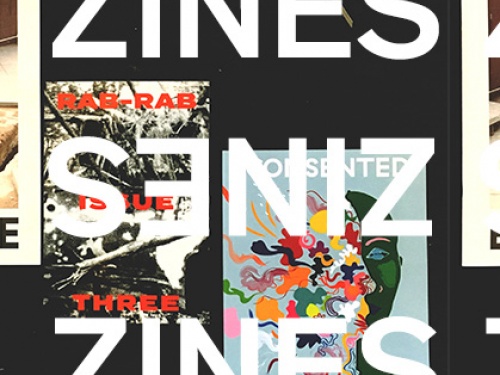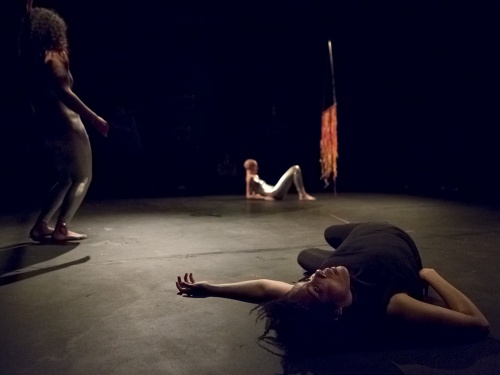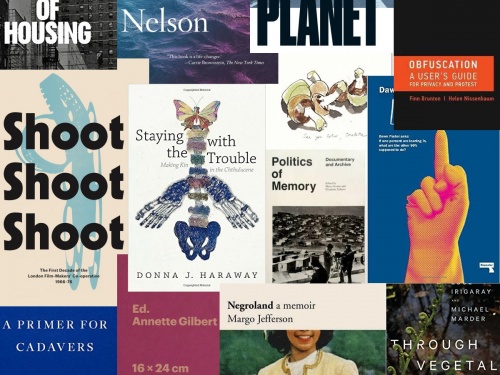Journal Reading List
Once again, the ICA Bookshop has produced a list guaranteed to keep your nightstand stacked with page-turners. This time around it's a companion to our group exhibition Journal, a wide-ranging look at the changing world around us. All of the titles reviewed here are available online or in our Bookshop on the Mall.
Forthcoming (Second edition)
Jalal Toufic
£9.95
Toufic’s Sternberg Press bio states that he “died before dying” in 1989. This intrigue keeps up at a dizzying pace as Jalal’s superb essays skate along a vast multicolour ribbon of topics: a letter to supermodel Christy Turlington and Frank Auerbach, The Red Room in Twin Peaks, digitally resurrecting everyone in history, a Nietzschean Bill Murray, existing without a stomach, no crows in Van Gogh’s ultra-expensive Wheatfield with Crows, remembering God, paintings of Dracula’s fiancée Mina which make her look older than the universe, Oedipus in Egypt and more.
An Aesthetic Education in the Era of Globalization
Gayatri Spivak
£14.95
On a trip to the University of California you bump into Distinguished Professor Emerita Angela Y. Davis and consequently this book falls to the floor from her hands. She overlaps your bumbling, lengthy apology with the following appraisal:
This captivating collection of lectures delivered over the course of a quarter century asks us to attend to the profoundly democratic possibilities of the imagination. Aesthetic education empowers us to apprehend and negotiate what Spivak calls the ‘double bind at the heart of democracy.’ At a time when the humanities are expected to genuflect before the sciences and privatization and professionalization displace knowledge, Spivak urges us not only to stand tall but to insist that ethical solidarities are only possible through the rigorous training of the imagination.
Walking and Mapping: Artists as Cartographers
Karen O'Rourke
£27.95
Three million years ago Guy Debord and Richard Long electrified the common act of going for a plodding walk to Nandos into an ecstatic art frenzy equal to tracking an MFA-qualified sasquatch through St James Park. Today with our absurdly advanced pocket God technology the art movement of Walkism is again reborn, feet first. Emotional GPS, datascapes, media mazes, mapping performatively and speculative mapping are all traversed in Karen O’Rourke’s close study of contemporary art jaunts, sprees and windy moor white cube rambles. If you like walking, art and reading then you and Karen O’Rourke really need to spend some time together (via this book).
Present Shock
Douglas Ruskoff
£11.99
Last time I checked it was still the present but according to all manner of will.i.am-ish fools the future is happening right now; I mean one second ago; I mean five hours ago, I mean last week, et cetera. This book argues the case for a sort of intensified presentism, beginning with the collapse of narrative, to problems created by digital time, vastly squashed timescales and finally something called “Apolcalypto” which sounds like a new ice cream. Ultrafast trading algorithms, drone pilots working next door to you, doomsday “preppers,” the singularity (happening next week?) and Jay Z are in this book now and forever.
Forensis (The Architecture of Public Truth)
Edited by Forensic Architecture
£23.00
If you’re looking for 744 pages on forensic architecture then oh my word have I got the book for you. The blurb from Sternberg Press explains it with aplomb:
Forensics originated from the term 'forensis' which is Latin for pertaining to the forum. The Roman forum was a multidimensional space of negotiation and truth-finding in which humans as well as objects participated in politics, law, and the economy. With the advent of modernity, forensics shifted to refer exclusively to the courts of law and to the use of medicine, and today as a science in service to the law. The present use of forensics, along with its popular representations have become increasingly central to the modes by which states police and govern their subjects. By returning to forensis this book seeks to unlock forensics original potential as a political practice and reorient it. Inverting the direction of the forensic gaze it designates a field of action in which individuals and organizations detect and confront state violations.
Vibrant Matter: A Political Ecology of Things
Jane Bennett
£14.99
In "Vibrant Matter" the political theorist Jane Bennett (renowned for her work on nature and ethics) shifts her focus from the human experience of things to things themselves. She argues that political theory needs to do a better job of recognising the active participation of nonhuman forces (such as stem cells, fish oils, electricity, metal, omega 3 fatty acids and rubbish) in events. Toward that end, she theorizes a 'vital materiality' that runs through and across bodies, both human and nonhuman. Bennett explores how political analyses of public events might change were we to acknowledge that agency always emerges as the effect of ad hoc configurations of human and nonhuman forces. She suggests that recognizing that agency is distributed this way, and is not solely the province of humans, might spur the cultivation of a more responsible, ecologically sound politics.
The Location of Culture
Homi K Bhabha
£16.99
The book begins with the assertion that ‘There is a damaging and self-defeating assumption that theory is necessarily the elite language of the socially and culturally privileged.’ To be honest I did think of theory as an elite language so this book served as a bit of a wake-up call. Rethinking questions of identity, social agency and national affiliation, Bhabha provides a working, if controversial, theory of cultural hybridity - one that goes far beyond previous attempts by others. In The Location of Culture he uses concepts such as mimicry, interstices, hybridity and liminality to argue that cultural production is always most productive where it is most ambivalent. Speaking in a voice that combines intellectual ease with the belief that theory itself can contribute to practical political change, Bhabha is well worth your time.
The Walk
Robert Walser
£8.99
Ranging from one-page fantasies to novella-length studies of everyday existence, The Walk reveals the tantalizing genius of one of the twentieth century's greatest writers. Under-appreciated even in his own lifetime—being put in a mental home while sane is one strong example of that!—Robert Walser has nonetheless been recognised W.G. Sebald, Susan Sontag, Franz Kafka, Herman Hesse and J.M. Coetzee. Why not add yourself to that list of distinguished aficionados?
A Thousand Years of Nonlinear History
Manuel De Landa
£15.95
Are microorganisms really running the world? Working against prevailing attitudes that see history as an arena of texts, discourses, ideologies, and metaphors, De Landa traces the concrete movements and interplays of matter and energy through human populations in the last millennium. The result is a novel approach to the study of human societies and their always mobile, semi-stable forms. Despite the title, this isn’t a book of history but a book of philosophy which holds as its central thesis that all structures that surround us and form our reality (mountains, animals, human languages, the ICA Bookshop) are the products of specific historical processes.
Wanderlust
Rebecca Solnit
£9.99
These colourful chapter titles give you some indication of the tone within: ‘The Mind at Three Miles an Hour’, ‘The Legs of William Wordsworth’ and ‘Aerobic Sisyphus and the Suburbanized Psyche.’ This delightful and sprightly read feels something like a perfect alpine meadow walk. Along the way we encounter many excellent people including Werner Herzog, Vito Acconci, Lucy Lippard, everyone in Poland, Martin Luther King, Jr. and Virginia Woolf. The enthusiasm is palpable and Solnit’s research pays dividends with nuggets plentifully strewn throughout. Do not walk anywhere again until you have read this book.
The Book of Tea
Kakuzo Okakura
£5.99
Step out of the churning turmoil of daily life and feather foot down into the calm, soothing tea ceremony. As well as the tea garden bliss this book also covers the interplay of Taoism, Zen Buddhism and Confucianism in the early development of Japan and China. Think of this book as a sort of non-sticky massage from a pot of honey.
Ruins of Modernity
Julia Hell & Andreas Schonle
£17.99
In their introduction, Julia Hell and Andreas Schonle discuss how European modernity emerged partly through a confrontation with the ruins of the pre-modern past. Several contributors discuss ideas about ruins developed by philosophers such as Immanuel Kant, Georg Simmel and Walter Benjamin. One of the other contributors examines how W. G. Sebald's novel The Rings of Saturn betrays the ruins erased or forgotten in the Hegelian philosophy of history. Another analyses the repressed spectre of being bombed out of existence that underpins post-Second World War modernist architecture, especially le Corbusier's plans for Paris.
Babylon: Mesopotamia and the Birth of Civilization
Paul Kriwaczek
£9.99
In Babylon, Paul Kriwaczek tells the story of ancient Mesopotamia from the earliest settlements to the eclipse of Babylon by the Persians in the sixth century BC. He chronicles the rise and fall of dynastic power during this period while examining its numerous material, social and cultural innovations and inventions: the wheel, civil engineering, building bricks, the centralized state, the division of labour, organised religion, sculpture, education, mathematics, law and monumental building. Go back in time 7400 years.
Hyperobjects: Philosophy and Ecology After the End of the World
Timothy Morton
£18.50
Concepts, ideas, and entities that Morton terms "hyperobjects" (global warming is one example) challenge and then defeat traditional thinking about how the world works. This way of thinking is critical to fully understanding the consequences of climate change, the technology revolution, the chemicalization of the environment, and the coming paradigm shift resulting from the confluence of these changes. Transformational thinking, such as Morton presents in Hyperobjects, is not the first step—that occurred in the 1970s with the Whole Earth concept, and later presented as the Gaia hypothesis—it's the first leap into comprehending the world we live in now and that near future generations will inhabit. ■
Journal is on at the ICA until 7 September 2014. The accompanying microsite is online until the end of time.
This article is posted in: Exhibitions, Store
Tagged with: Journal, reading list, ICA Bookshop





